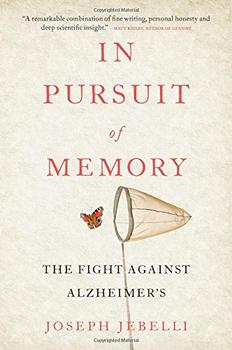Summary | Excerpt | Reviews | Beyond the Book | Readalikes | Genres & Themes | Author Bio

The Fight Against Alzheimer's
by Joseph JebelliPreface: 'A Peculiar Disease'
WHEN I WAS twelve years old, my grandfather began to act strangely. I had known Abbas Jebelli as a self-effacing man, whose strong sense of family frequently carried him from volatile Iran to our quiet street in Bristol, England. He used to arrive with suitcases filled with pistachio nuts and Persian sweets, smiling until the corners of his eyes wrinkled as he handed us our gifts.
It started with inexplicable walks. When he was visiting, he'd leave the dinner table and then we would find him, half an hour later, aimlessly wandering the neighbourhood. 'Please stop doing that,' my father would say. 'Bebakhshid,' ('forgive me') was all Abbas ever replied in his native Farsi. His bright smiles were gradually replaced by a fearful, withdrawn expression, as if he'd lost something irreplaceable. Before long, he didn't recognise his own family.
Something indefinably peculiar had happened to him.
As far as I knew, though, Abbas was just getting old. For decades, human lifespan had been rising. In the 1940s you'd be lucky to make it to age fifty, my father had explained, but we're now living in the 1990s and Granddad was a leathery seventy-four-year-old whose mind, like his sight and nearly everything else, was slowly wearing out.
But that explanation never felt right. My young mind had no notion yet of the endless intricacies of the human brain, of the 85 billion cells that knit fragments of the past together into a ghostly tapestry that we call memory. Perhaps it was the sheer indiscriminateness of this bizarre affliction. Why, if this was 'normal', was my grandmother not going through the same thing? Why was the Queen still able to make such eloquent speeches on television when Abbas couldn't even draw a clock face? Why, for that matter, wasn't everyone who reached old age experiencing this?
Seventeen years later, I am standing in a small, dimly lit room in the Institute of Neurology at University College London. Glass beakers, pipettes, shelves filled with chemicals and reagents, and a large grey centrifuge surround me. The air is filled with the stinging scent of ethanol, and there's a quiet hum as curtains of sterile air separate me from the nearby workstations. I stare into a small light microscope, focusing the image until the contours of numerous circular entities come into view. These are brain cells, taken from a rat, which I'm hoping will make some sense of what happened to my grandfather and millions of others just like him–all stricken by one of the most terrifying illnesses of modern times: Alzheimer's disease.
The cells I'm looking at were already sick when I plated them two weeks ago; they've come from animals engineered to have the disease inscribed in their DNA. As expected, the now infamous plaques–dark patches that appear in the brains of Alzheimer's patients, proposed to be the disease's root cause twenty-five years ago–have started to form between them. But hidden among this neurological nightmare are the brain's immune cells, microglia. And if the immune stimulant I've given them works, they could unleash a potent chemical attack on the plaques, physically engulfing and degrading them in a cellular defence mechanism called phagocytosis. Whether they will, though, still remains a question.
This theory is one of many that scientists are now testing, for Alzheimer's is already a disease of global significance. It affects 47 million people worldwide and more than 800,000 in the UK alone. As the world's population ages, Alzheimer's is expected to affect 135 million people by 2050, overtaking cancer to become the second leading cause of death after heart disease. We've now reached a point at which almost everyone knows someone–whether a family member or a friend–who has been affected.
Excerpted from In Pursuit of Memory by Joseph Jebelli. Copyright © 2017 by Joseph Jebelli. Excerpted by permission of Little Brown & Company. All rights reserved. No part of this excerpt may be reproduced or reprinted without permission in writing from the publisher.
Your guide toexceptional books
BookBrowse seeks out and recommends the best in contemporary fiction and nonfiction—books that not only engage and entertain but also deepen our understanding of ourselves and the world around us.